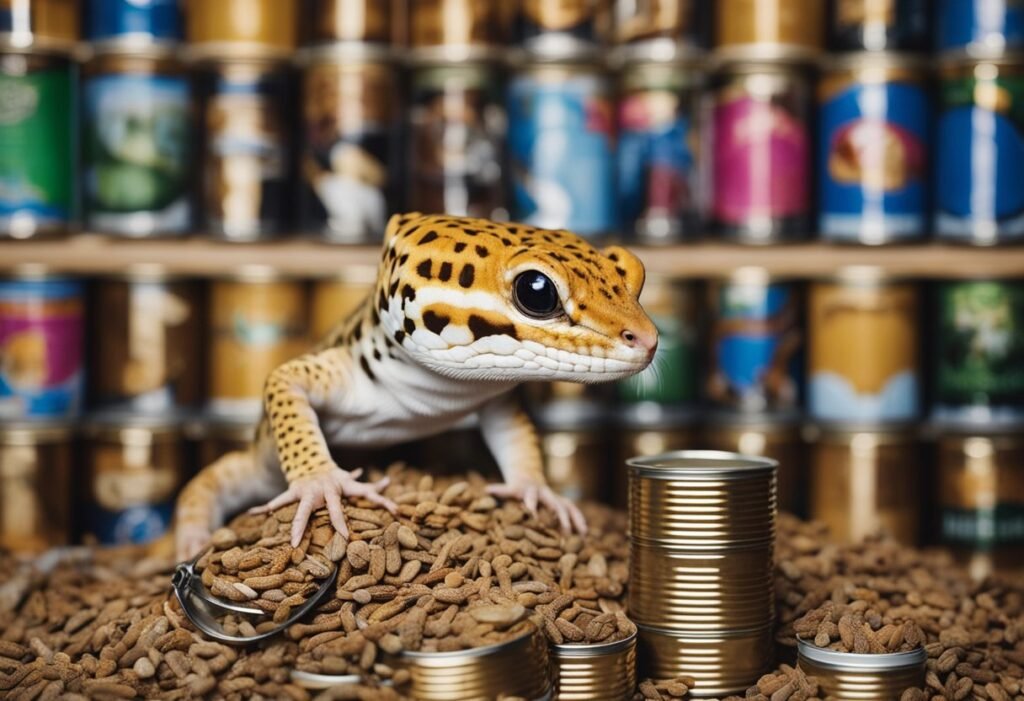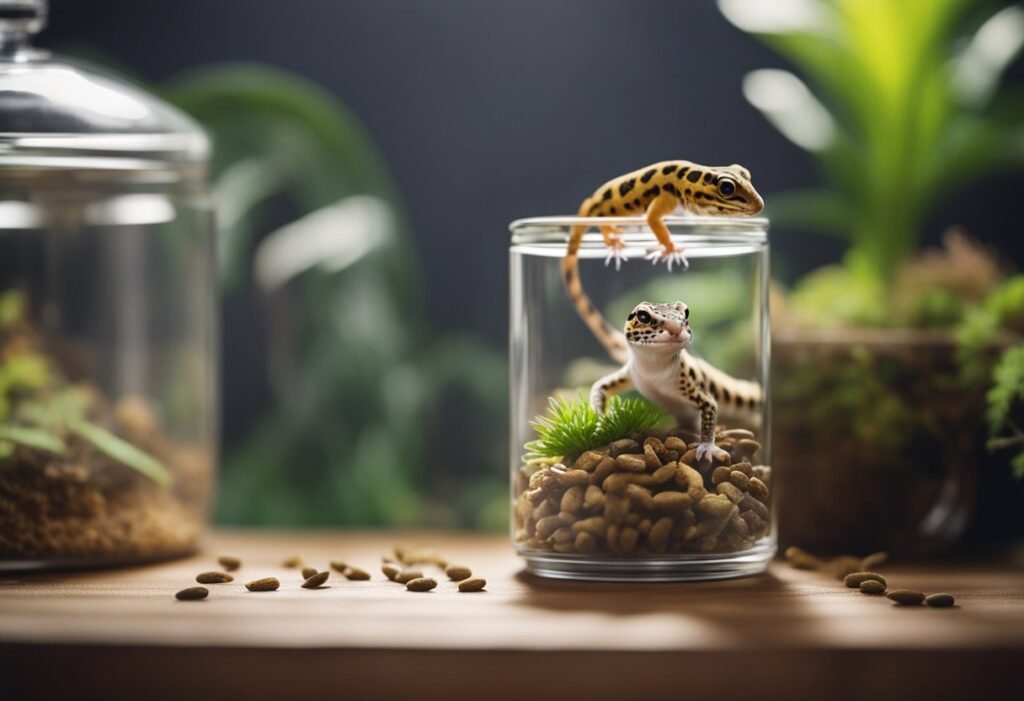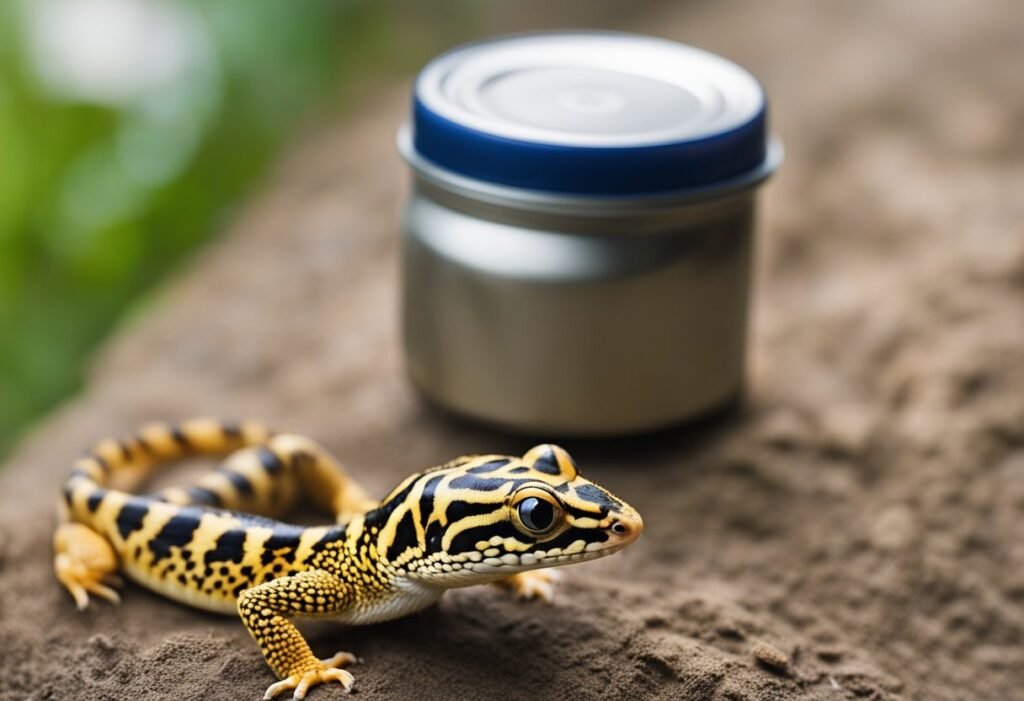Leopard geckos are one of the most popular reptile pets due to their docile nature and low maintenance. As with any pet, it is important to provide them with a balanced and nutritious diet. While live insects are the preferred food for leopard geckos, canned insects are often used as a convenient alternative. In this article, we will explore whether or not leopard geckos can eat canned crickets.
Canned crickets are a popular choice for reptile owners as they are easy to store and have a long shelf life. However, it is important to note that canned crickets do not provide the same nutritional value as live crickets. Live crickets are a great source of protein and calcium, which are essential for the health of leopard geckos. Canned crickets, on the other hand, are often lacking in these nutrients and may contain preservatives and other additives that can be harmful to your pet.
Leopard Gecko Dietary Basics
When it comes to feeding leopard geckos, it’s important to understand their dietary needs to ensure they stay healthy and happy. In this section, we’ll cover the basic nutritional needs and feeding frequency for leopard geckos.
Nutritional Needs
Leopard geckos are insectivores, which means they primarily eat insects. They require a balanced diet that includes a variety of insects to ensure they get all the nutrients they need. Some of the key nutrients leopard geckos need include:
- Protein: This is essential for growth and development, as well as maintaining muscle and tissue health.
- Calcium: Leopard geckos need calcium for strong bones and to prevent metabolic bone disease.
- Vitamins: A variety of vitamins are important for leopard geckos, including vitamin A, which is important for vision and immune system health.
It’s important to note that leopard geckos can’t produce their own vitamin D3, so they need to get it from their diet or from exposure to UVB light.
Feeding Frequency
Leopard geckos should be fed every 2-3 days, with adult geckos eating slightly less often than juveniles. The amount of food they need will depend on their size and age, but a general rule of thumb is to feed them as much as they can eat in 10-15 minutes.
It’s important to offer a variety of insects to ensure they get all the nutrients they need. Some good options include crickets, mealworms, and dubia roaches. It’s also important to dust their food with a calcium supplement to ensure they get enough calcium.
Overall, understanding the nutritional needs and feeding frequency of leopard geckos is essential for keeping them healthy and happy. By providing a balanced diet and offering a variety of insects, you can ensure your leopard gecko gets all the nutrients they need to thrive.
Understanding Canned Crickets
Canned Crickets Overview
Canned crickets are commercially available in pet stores and online. They are a convenient option for pet owners who want to provide their leopard geckos with a reliable source of protein. These crickets are cooked and canned, which means they have a long shelf life and can be stored at room temperature.
One advantage of canned crickets is that they are easy to store and use. They don’t require any special care or feeding, and they can be used as needed. However, it’s important to note that canned crickets are not a replacement for live food. They should be used as a supplement to a varied diet that includes live insects.
Nutritional Value
Canned crickets are a good source of protein and other essential nutrients. They are low in fat and high in protein, which makes them a good choice for leopard geckos. However, it’s important to note that canned crickets may not be as nutritious as live crickets.
One disadvantage of canned crickets is that they may lose some of their nutritional value during the canning process. They may also contain preservatives and other additives that are not present in live crickets. For this reason, it’s important to use canned crickets as a supplement to live food, rather than a replacement.
In conclusion, canned crickets can be a convenient option for leopard gecko owners who want to provide their pets with a reliable source of protein. However, they should be used as a supplement to live food, rather than a replacement. It’s important to choose high-quality canned crickets that are free from preservatives and other additives.
Benefits of Canned Crickets for Leopard Geckos
Canned crickets are a convenient and nutritious option for feeding leopard geckos. Here are some benefits of feeding your leopard gecko canned crickets:
1. Convenience
Canned crickets are readily available in most pet stores and online. They are also easy to store and have a long shelf life, making them a convenient option for busy pet owners.
2. Nutritional Value
Canned crickets are a good source of protein, which is essential for the growth and maintenance of leopard geckos. They also contain important nutrients such as calcium, which is important for bone health, and vitamin B12, which is important for energy metabolism.
3. Safety
Canned crickets are free from parasites and pathogens that can be present in live crickets. This reduces the risk of your leopard gecko getting sick from their food.
4. Variety
Feeding your leopard gecko a variety of foods is important for their overall health and wellbeing. Canned crickets can be a good addition to their diet, along with other insects such as mealworms and waxworms.
Overall, canned crickets can be a convenient and nutritious option for feeding your leopard gecko. However, it is important to remember that they should not be the only source of food for your pet. A varied diet that includes live insects, fresh fruits and vegetables, and a high-quality commercial gecko food is essential for their health and wellbeing.
Potential Risks of Feeding Canned Crickets

When it comes to feeding our leopard geckos, we want to make sure that we are providing them with the best nutrition possible. While canned crickets may seem like a convenient option, there are some potential risks to consider before adding them to your gecko’s diet.
Lack of Movement
One of the main concerns with canned crickets is that they lack the movement and activity that live crickets have. Leopard geckos are natural hunters and enjoy chasing and catching their prey. Canned crickets, on the other hand, are stationary and do not provide the same level of stimulation for your gecko. This lack of movement can lead to boredom and a decrease in natural hunting instincts.
Preservatives and Additives
Canned crickets often contain preservatives and additives such as salt, which can be harmful to your gecko’s health. These additives can cause dehydration and other health issues if consumed in large quantities. Additionally, some canned crickets are not nutritionally balanced and may not provide the necessary vitamins and minerals that your gecko needs to thrive.
In conclusion, while canned crickets may seem like a convenient option, there are potential risks to consider before adding them to your gecko’s diet. The lack of movement and preservatives and additives in canned crickets can lead to health issues and a decrease in natural hunting instincts. It is always best to provide your leopard gecko with a varied and balanced diet of live insects to ensure their optimal health and well-being.
How to Feed Canned Crickets to Leopard Geckos

Canned crickets can be a convenient and cost-effective option for feeding leopard geckos. However, it’s important to know how to properly prepare and serve them to ensure your gecko is getting the nutrition they need. Here are some steps to follow:
Preparation Steps
- Check the expiration date: Make sure the canned crickets are not expired before feeding them to your leopard gecko.
- Drain the liquid: Open the can and drain the excess liquid from the can.
- Rinse the crickets: Rinse the crickets in warm water to remove any debris or dirt.
- Gut-load the crickets: Before feeding the canned crickets to your leopard gecko, gut-load them with nutritious food such as fruits, vegetables, or commercial gut-loading products. This will ensure that your gecko is getting the necessary nutrients from the crickets.
Serving Size
It’s important to feed your leopard gecko an appropriate amount of canned crickets. Here are some guidelines to follow:
- Size of the gecko: The amount of canned crickets you should feed your leopard gecko depends on their size. Generally, you should feed them 2-4 crickets per feeding.
- Frequency of feeding: Leopard geckos should be fed 2-3 times per week.
- Variety: It’s important to offer your leopard gecko a variety of food, including live insects, to ensure they are getting a balanced diet.
By following these steps, you can safely and effectively feed canned crickets to your leopard gecko. Remember to always monitor your gecko’s health and adjust their diet as necessary.
Alternatives to Canned Crickets

Leopard geckos are known to be voracious eaters and require a varied diet to remain healthy. While canned crickets are a convenient option, they may not provide all the necessary nutrients that live prey can offer. Here are some alternatives to canned crickets that you can consider for your leopard gecko.
Live Prey Options
Live prey is always the best option for leopard geckos as it provides them with the necessary nutrition and exercise. Some of the live prey options that you can consider for your leopard gecko include:
- Mealworms: Mealworms are a popular option for leopard geckos. They are high in protein and can be easily gut-loaded to provide additional nutrients.
- Dubia Roaches: Dubia roaches are another excellent option for leopard geckos. They are high in protein and low in fat, making them an ideal choice for geckos that need to maintain a healthy weight.
- Crickets: Live crickets are another option to consider. They are high in protein and can be easily gut-loaded to provide additional nutrients.
Commercial Diets
If you are unable to provide live prey for your leopard gecko, commercial diets can be a good alternative. However, it is important to ensure that the diet you choose is specifically formulated for leopard geckos and provides all the necessary nutrients. Some of the commercial diets that you can consider include:
- Repashy Crested Gecko Diet: This diet is formulated for crested geckos but can also be used for leopard geckos. It is high in protein and provides all the necessary nutrients.
- Pangea Fruit Mix: This diet is a fruit-based diet that is formulated for crested geckos but can also be used for leopard geckos. It is high in protein and provides all the necessary nutrients.
In conclusion, while canned crickets may be a convenient option, they may not provide all the necessary nutrients that live prey can offer. Live prey options and commercial diets can be good alternatives to consider for your leopard gecko’s diet.
Monitoring Your Leopard Gecko’s Health
As responsible pet owners, it is crucial to monitor our leopard gecko’s health regularly. Here are some essential tips to keep in mind:
1. Observation
Observation is key when it comes to monitoring your leopard gecko’s health. Regularly observe your pet’s behavior, appetite, and overall activity level. Any sudden changes in behavior or a decrease in activity or appetite could be a sign of illness.
2. Regular Weigh-Ins
Leopard geckos should be weighed regularly to ensure they are maintaining a healthy weight. We recommend weighing your leopard gecko once a week and keeping track of their weight in a logbook or spreadsheet.
3. Proper Nutrition
Proper nutrition is essential for your leopard gecko’s health. We recommend feeding them a diet of live insects such as crickets, mealworms, and waxworms. While canned crickets can be a convenient option, they should not be the primary source of food for your leopard gecko as they lack the necessary nutrients and moisture.
4. Regular Vet Visits
Regular visits to the veterinarian are crucial to ensure your leopard gecko is healthy. We recommend scheduling an appointment with a reptile veterinarian at least once a year for a check-up.
By following these tips, you can ensure that your leopard gecko stays healthy and happy for years to come.
Frequently Asked Questions
What is the best diet for a leopard gecko?
Leopard geckos are insectivores, which means they require a diet that is high in protein and low in fat. The best diet for a leopard gecko consists of a variety of appropriately sized insects, such as crickets, mealworms, and waxworms. It is important to provide a balanced diet that includes a variety of insects to ensure that your leopard gecko receives all of the necessary nutrients.
Are mealworms a suitable food for leopard geckos?
Mealworms can be a suitable food for leopard geckos, but they should not be the only food offered. Mealworms are high in fat and low in calcium, so they should be fed in moderation. It is important to dust the mealworms with a calcium supplement before feeding them to your leopard gecko.
Can leopard geckos safely consume vegetables, and if so, which ones?
Leopard geckos are not able to digest vegetables effectively, and they should not be included in their diet. Feeding vegetables to your leopard gecko can lead to digestive problems and other health issues.
Is it healthy for leopard geckos to eat fruit?
Leopard geckos should not be fed fruit as it is high in sugar and low in nutrients. Feeding fruit to your leopard gecko can lead to health problems, including obesity and dental issues.
What types of insects are appropriate to include in a leopard gecko’s diet?
Appropriate insects for a leopard gecko’s diet include crickets, mealworms, waxworms, and roaches. It is important to offer a variety of insects to ensure that your leopard gecko receives all of the necessary nutrients.
How long can canned crickets be stored before they are considered spoiled?
Canned crickets can be stored for up to six months before they are considered spoiled. It is important to check the expiration date before feeding canned crickets to your leopard gecko. Once opened, canned crickets should be stored in the refrigerator and used within a few days.





